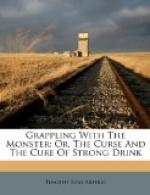The experience of Massachusetts is, as we have already said, the experience of every community, State or nation in which an effort has been made to abridge the evils of intemperance by licensing the dram-shop.
And to whom and to what class of citizens does the State accord, under license, the privilege of making gain out of the people’s loss? For whom is every interest in the nation taxed and every industry hurt? For whom are the houses of the poor made poorer; and the supply of bread diminished? For whom are a crime-assaulted and pauper-ridden people driven to build jails and poor-houses, and insane asylums, and maintain courts and juries and a vast army of police, at the cost of millions of dollars every year?
For great benefactors to whom the nation owes a debt of gratitude? For men who are engaged in great industrial or commercial enterprises? Promoters of education? leaders in the great march of civilization? Even if this were so, better not to have accepted the service than pay for it at so fearful a cost.
Who and what are these men?—this great privileged class? Let us see. In Boston, we have the testimony of the License Commissioners that liquor-selling is in the hands of “irresponsible men and women,” who pay a license for the privilege of doing “as they please after payment.” And for the maintenance of these “irresponsible” men and women in their right to corrupt and degrade the people, a forced tax is laid on every bit of property and every interest in the great city of Boston! What was the tax on tea to this? And yet, Boston patiently submits!
Is it better in New York, Philadelphia, Baltimore, Cincinnati, Chicago or any other of our large cities? Not a whit! In some it is worse, even, than in the capital of the old Bay State. In one of these last-mentioned cities, where, under the license system so dear to politicians, and for which they are chiefly responsible, between seven and eight thousand places in which liquor is sold at retail exist, an effort was made in 1876 to ascertain the character and antecedents of every person engaged in dram-selling. We are not able to say how carefully or thoroughly the investigation was pursued, but it was in the hands of those who meant that it should be complete and accurate. One fact elicited was, that the proportion of native-born citizens to the whole number engaged in the business was less than one-sixth. Another was, that over six thousand of these dram-sellers belonged to the criminal class, and had suffered imprisonment, some for extended terms in the State prison. And another was, that nearly four thousand of the drinking-places which had been established under the fostering care of State license laws were houses of ill-fame as well! Comment is unnecessary.
We cannot lessen the evil nor abate the curse of drunkenness so long as we license a traffic, which, from its essential hostility to all the best interests of society, naturally falls into the hands of our worst citizens, who persistently violate every salutory and restrictive feature in the laws which give their trade a recognized existence.




